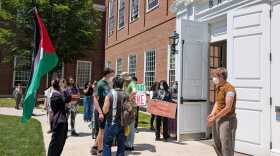Earlier this week, the Trump Administration announced it will raise tariffs on lumber imported from Canada. The move comes in response to claims that the Canadian Government is providing unfair subsidies, which help undercut American producers. For home builders and saw mills in New Hampshire, the announcement is prompting very different reactions.
A few blocks from downtown Concord, a former Catholic Church is being converted into condos. Sprinkler installers and HVAC guys are on site, and Bob Chagnon is finishing off some trim work.
“[I] do a little bit of everything,” he says. “Frame to finish, a little bit of everything.”
Chagnon says most of the wood in this project has been stamped Canadian. Under the new policy from the Trump Administration, that lumber is going to be hit with an average 20% tariff.
That means dimensional lumber like two-by-fours, which today cost around $4, could jump to $4.75 or more.
“It impacts the consumer,” says Chagnon. “It doesn’t impact me.”
The United States and Canada have been arguing over lumber imports since at least the 1980s. The U.S. says Canada has an unfair advantage by allowing logging on vast public lands. The Canadians argue they are doing nothing wrong, but that isn’t stopping the Trump Administration from firing back.
The newly announced tariff is welcome news to lumber trade groups, and the 80 or so employees of the Milan Lumber Company in Coos County, one of the largest saw mills in the state.
“That’s what the industry is looking for, basically to put things on a level playing field,” says Jethro Poulin with Milan Lumber.
If the game is played fairly, the domestic mills say they can compete on quality and price.
The rub here, though, is that home builders in New Hampshire, regardless of price, need that Canadian spruce, pine and fir.
“The United States does not produce nearly enough to meet the demands in the northeast,” says Paul Morin, president of Tarkka Homes, a custom home builder in Hopkinton. “We import a lot of it from Canada, so the northeast region is particularly vulnerable in this situation.”
Another wrinkle here is that a lot of North Country timber actually goes across the border to be milled in Quebec, then it gets shipped back into the state. That wood could also now face the 20% price hike.
In Concord, Jon Chorlian is the man in charge of the condo project. He says for developers, price swings like this are nothing new.
“Steel goes up, copper goes up, it goes down,” he says.
And while consumers may ultimately bear those costs, Chorlian doesn’t think the economic impact of this tariff may not amount to much.
“If you did a million dollar project and these tariffs are imposed, how much would that million dollar project turn into? I don’t know a million-fifteen [thousand]? I’m sure we could find something better to do with $15,000, but it's not going to be the difference between a project getting built or not built.”
Still, it’s a new cost that home buyers and builders are going to have to deal with.








